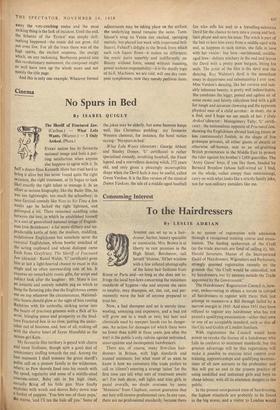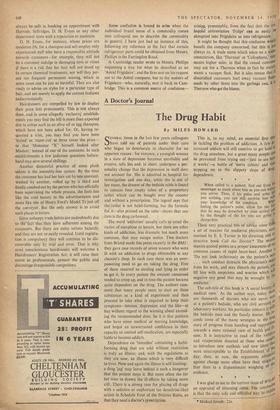Consuming Interest
To the Hairdressers
By LESLIE ADRIAN Now, a bad shampoo and set is merely time- wasting, annoying and expensive, and a bad cut will grow out in a week or two; but heat and chemicals used by inexpert hands can be danger- ous. An action for damages (of which there were no fewer than 6,000 in three years, just after the war) is the public's only redress against untrained, unscrupulous and incompetent hairdressers.
There are, of course, many first-class hair- dressers in Britain, with high standards and trained assistants; but what 'most of us want to know is how we customers (the trade prefers to call us 'clients') entering a strange 'salon' for the first time can tell what sort of treatment awaits us? For lush d6cor, soft lights and trim girls in pastel overalls, no doubt overseen by some `Monsieur' from Clapham, cannot guarantee that our hair will receive professional care. In any case, there are no professional standards; because there is no system of registration with admission through a recognised training course and exam- ination. The leading spokesman of the Craft (as the trade journals are fond of calling it), Mr. Harold Semmens, Master of the Incorporated Guild of Hairdressers, Wigmakers and Perfumers, strongly opposed registration recently on the grounds that 'the Craft would be controlled, not by hairdressers, but by persons outside the Trado appointed by the Government.'
The Hairdressers' Registration Council is, how- ever, endeavouring to obtain a statute to compel all hairdressers to register with them; their last attempt to manoeuvre a Bill through failed by a narrow margin in 1949. And since 1951 they have refused to register any hairdresser who has not passed a qualifying examination—either their own or one of an acceptable standard, such as that of the City and Guilds of London Institute.
With registration the Council would have power to revoke the licence of a hairdresser who fails to conform to minimum standards; but the greatest advantage will be that registration will make it possible to exercise strict control over training, apprenticeships and qualifying examina- tions of all new entrants to the profession; and this will put an end to the present practice of using unskilled and untrained girls and boys as cheap labour, with all its attendant dangers to the public.
In the present unorganised state of hairdressing, the highest standards are probably to be found in the big stores, and a visitor to London would always be safe in booking an appointment with Harrods, Selfridges, D. H. Evans or any other .department store with a reputation to maintain.
D. H. Evans, for instance, whose prices are moderate (9s. for a shampoo and set) employ only experienced staff who have a responsible attitude towards customers—for example, they will not let a customer indulge in damaging tints or rinses if there is a risk that her hair will not stand up to certain chemical treatments; nor will they per- mit too frequent permanent waving, which in some cases can be just as harmful. They are also ready to advise on styles for a particular type of hair, and not merely to apply the current fashions indiscriminately.
Hairdressers are compelled by law to display their price lists prominently. This is not always done, and in some allegedly 'exclusive' establish- ments you may find the bill is more than expected due to extras such as an olive oil or egg shampoo, which have not been asked for. Or, having re- quested a trim, you may find you have been 'styled' or 'razor-cut' at three times the price— or that 'Monsieur "X" himself looked after Madam,' instead of one of the assistants. In such establishments a few judicious questions before- hand may save several shillings.
Another distasteful practice of some plush salons is the assembly-line system. By the time the customer has had her hair cut by one assistant, washed by another, rolled up by a third and finally combed out by the person who has officially been supervising the whole process, she feels less like the cool beauty in the advertisements and more like one of Henry Ford's Model Ts just off the conveyor. But the only answer is to avoid such places in future.
Some unhappy trade habits are undoubtedly due to the fact that they have adherents among the customers. But there are more serious hazards; and they are not so easily revealed. Until registra- tion is compulsory they will continue to be dis- coverable only by trial and error. That is why most conscientious hairdressers will welcome a Hairdressers' Registration Act; it will raise their status as professionals, protect the public and discourage irresponsible competitors. Some confusion Is bound to arise when the individual brand name of a commodity comes into colloquial use to describe the commodity in general. I have just had an instance of this, following my reference to the fact that certain refrigerator parts could be obtained from Messrs. Phillips in the Farringdon Road.
A Cambridge reader wrote to Messrs. Phillips requesting a tray for what he described as an 'Astral Frigidaire'; and the firm sent on his request not to the Astral company, but to the makers of Frigidaire—who, naturally, sent it back to Cam- bridge. This is a common source of confusion— arising, presumably, from the fact that the col- loquial abbreviation 'fridge' can as easily be elongated into Frigidaire as into refrigerator. It might be thought that this confusion would benefit the company concerned, but this is not always so. A trade name which takes on a wider connatation, like 'Thermos' or 'Cellophane,' maY secure higher sales, in that the casual customer may ask for a Thermos when in fact he merely wants a vacuum flask. But it also means that if dissatisfied customers hurl away vacuum flasks made by other firms into the garbage can, it's Thermos who get the blame.







































 Previous page
Previous page